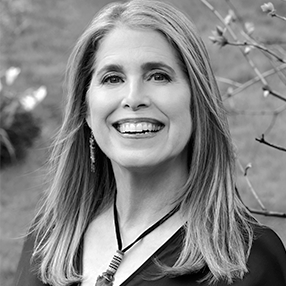Wa-zha’-zhe, name of the Osage tribe . . . who came from the stars.
—“The Osage and the Invisible World: From the Works of Francis LaFlesche”
The first language
𐓷𐓘𐓻𐓘𐓻𐓟 which Eliza,
her grandmother, spoke.
I try to learn
the words 𐓣𐓟
from a book, a dictionary.
What was my mother taught
as a young girl sitting
on the front stoop
of her grandma’s house
inhabited by half-brothers
she revered. Her favorite,
Hunky, hand outstretched,
showed her how to catch
the wild horse
𐓤𐓘𐓷𐓘 𐓷𐓘𐓲𐓟𐓸𐓣
unbridled in the pasture.
She knotted a paisley
bandana around her
neck. This language
for throat 𐓰𐓪𐓲𐓟
and tongue 𐓵𐓟𐓺𐓟 –
words she learns
to speak but then
forgets. She loosens
𐓷𐓟𐓵𐓣͘ the rope
from the horse’s crest.
The Osage orthography
𐓏𐒰𐓓𐒰𐓓𐒷 Osage
𐒻𐒷 words
𐒼𐒰𐓏𐒰 𐓏𐒰𐓊𐒷𐓐𐒻 wild horse
𐓈𐓂𐓊𐒷 throat
𐓍𐒷𐓒𐒷 tongue
𐓏𐒷𐓍𐒻͘ rope
Copyright © 2024 by Elise Paschen. Originally published in Poem-a-Day on November 12, 2024, by the Academy of American Poets.
“This poem is a language origin story which imagines my mother as a child hearing Osage. Her father, conditioned by Indian boarding school, spoke only English even though his mother conversed in Osage. The poem, originally part of a long sequence titled ‘Heritage,’ arrived quickly, eventually becoming its own poem, which sustains the stanzaic structure of ‘Heritage’: indented staggered lines in fives. For many years, I have explored our language in Osage dictionaries. In this poem’s initial drafts, I incorporated the phonetic translations of the Osage words from Carolyn Quintero’s Osage Dictionary. The Osage Nation recently created its own online orthography dictionary, so I translated the phonetic spellings into orthography and then confirmed my work with Christopher Côté of the Osage Nation Language Department. I believe my great-grandmother, [Eliza Bigheart] Tallchief, would be proud to see our language resuscitated today.”
—Elise Paschen

